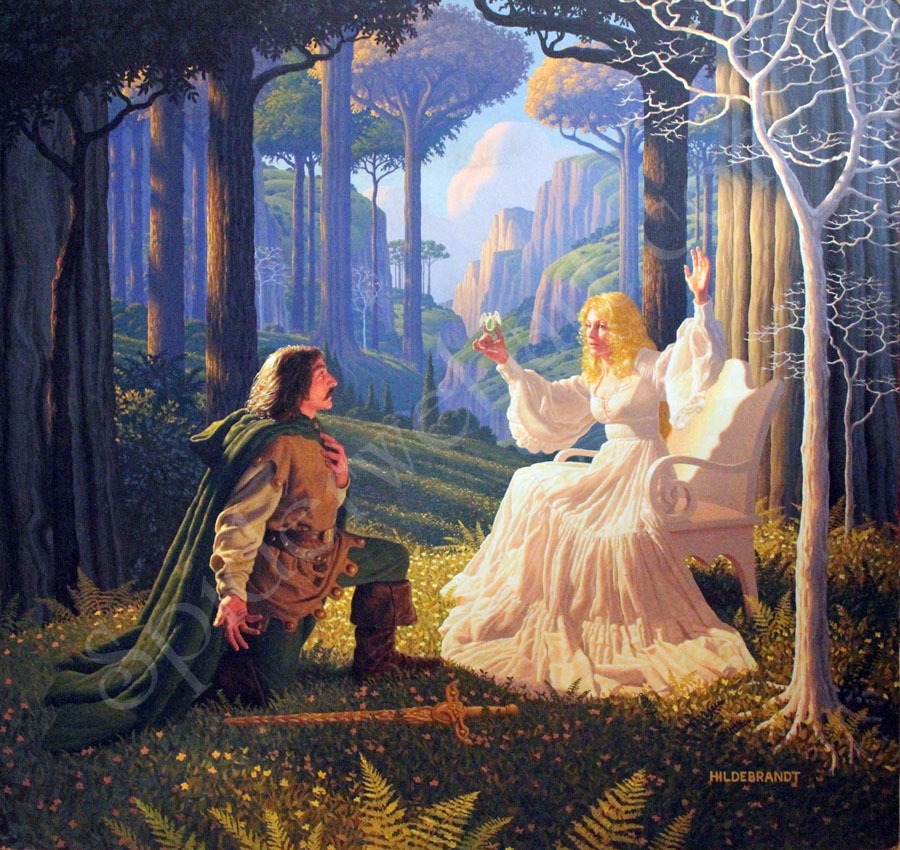The Two Towers by J.R.R Tolkien (Harper Collins 1991, 2007) pp. 787-789
It has been three days since the Fellowship was broken at Parth Galen and Frodo and Sam have been wandering in the Emyn Muil, always looking for a way to bring them down to the marshes below but always finding that the eastern slopes are too steep to do this with any kind of safety. Westwards on this same day Merry and Pippin have just met with Treebeard in Fangorn, Aragorn, Legolas and Gimli follow them and in two days will meet with Gandalf who has made his way directly from Lothlórien to Fangorn.

Frodo and Sam cannot find a way forward in the Emyn Muil.
Sam fears that they are lost, that they have come the wrong way. Should they make their way back and try another? Frodo does not think it possible to retrace their steps. They have hardly taken a straightforward path through the hills that would make this an easy choice and there are orcs patrolling the eastern banks of the Anduin. No, somehow there needs to be a way forward.
Frodo thinks about his doom. We have come to think of this word in dark terms. I remember a much loved sitcom from my youth set in the days of the Second World War in England when a German invasion was expected at any moment. There was a Scottish character who would respond to any difficulty with the words, “We’re all doomed,” in other words, we’re all finished. But this is not what Frodo means. He uses the word in an older sense in which doom meant judgement. People would speak of doomsday as meaning the day of judgement, the day on which their eternal destiny would be decided.

Private Fraser expresses his personal philosophy of life, shaped by Scottish Calvinism.
But there was another meaning that takes us back in the story to Lothlórien and the words that Galadriel spoke to the company as they prepared to continue their journey onward and wondered which way they should take.
“Do not trouble your hearts overmuch with thought of the road tonight. Maybe the paths that each of you shall tread are already laid before your feet, though you do not see them.”
And none of the Fellowship could see, at that moment, the paths that they were to follow in the days that followed their departure from Lothlórien. Only Boromir among them was absolutely certain which way he should go. He would go to Minas Tirith and he thought that the Fellowship should go with him. But Boromir’s journey ends when the Fellowship is broken. Aragorn is torn between his desire to go with Boromir to Minas Tirith, to the land over which he will become king, but feels that he cannot abandon Frodo. On the day of the breaking of the Fellowship he will make another choice completely and one that he never anticipated; he will follow Merry and Pippin across the plains of Rohan with Legolas and Gimli and while failing to find them will find Gandalf once more.
And Frodo and Sam are stuck in the barren Emyn Muil with seemingly no way forward.
It is a feature of our lives that we are aware for the most part only of the circumstances in which we find ourselves. Frodo and Sam have no awareness of the great events that are unfolding westwards that will lead to the fall of Isengard. They only know that at this moment they cannot find a path. But Frodo has a sense that he is a part of a bigger story, one that is carrying him along, even against his own will. This sense is called a belief in Providence. Gandalf told him that he was meant to have the Ring. Galadriel told him that his path was already laid before his feet. And even though at this point he has no idea how he will find that path he believes that it will be found. And in that faith he will keep on going. He will find a way to Mordor and his doom.

Frodo and Sam will find a way. Kenneth Anthony’s imagining of the scene.
























